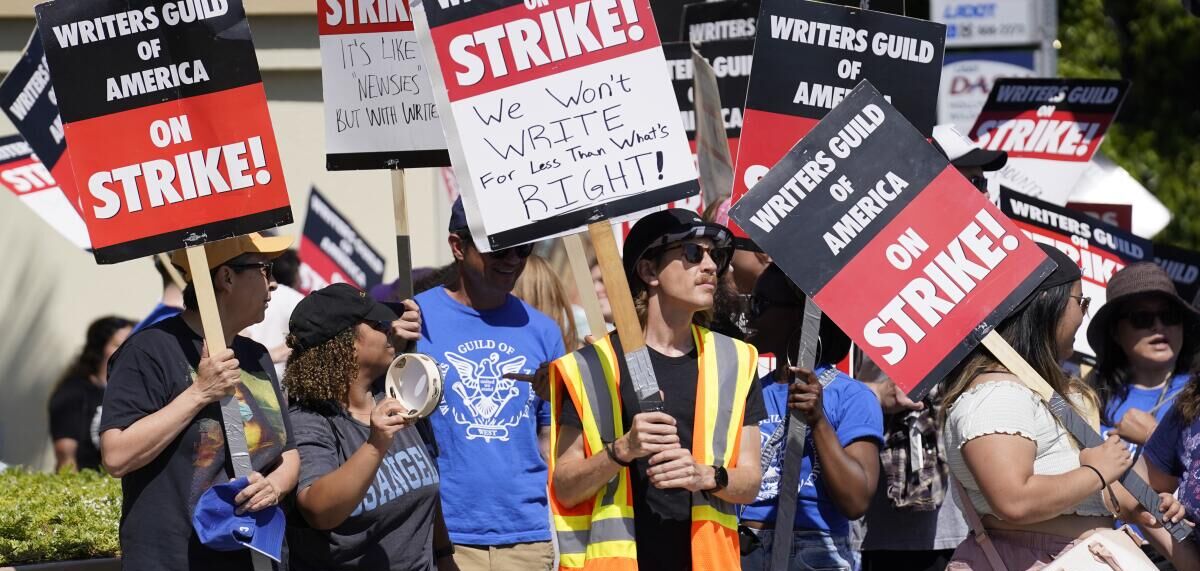To anybody who thought they’d finally be able to remove the word ‘strike’ from their Google Alerts: the joke’s on you.
If you’re up on the latest pop-culture news, it’s pretty likely that you’ve been hearing a whole salad of acronyms such as WGA, SAG-AFTRA, and AMPTP being thrown around. More specifically, you’ve probably recently heard the news that the WGA have ‘won’ their strike, whatever that means. The story behind all of it is a whole lot more interesting than those titles and headlines would have you believe, however, setting the stage for a series of strikes that may well change the face of the TV and movie industry in ways you haven’t even considered, and the WGA securing a victory that will likely have ripple effects for years to come.
Before we get to what’s already happened and what’s yet to come, let’s take a look at the major players. AMPTP is the Alliance of Motion Picture and Television Producers, an American trade association that represents the big names in the entertainment industry: we’re talking Warner Bros, Disney, Paramount Pictures, Netflix, Apple TV, and more. The WGA and SAG-AFTRA - Writers Guild of America and Screen Actors Guild (American Federation of of Television and Radio Artists), respectively - are trade unions that represent, yes, Chris Evans and Quentin Tarantino, but also the hundreds of thousands of other actors, writers, and directors who are really leaning into the ‘starving’ part of the starving artist role.
On the second of May 2023, the WGA went on strike. Less than four months later, SAG-AFTRA followed suit, and between the two of them, they effectively ground TV and movie production to a screeching halt.
So why are they striking, anyway?
Remember when you were a kid and told your parents you wanted to be a famous writer or actor when you grew up, and they oh-so-gently (or not) said how that was a very nice idea, but maybe you could aim for something with a little more financial security? Yeah, well, they may have been onto something there
Both the WGA and SAG-AFTRA were concerned about improvements to the overall working conditions in their industry, with a particular emphasis on their members making a living wage, something that has become less and less attainable in the entertainment industry over the years. The writers were asking for increased pay, as well as mandated staffing requirements - stopping the practice of ‘mini rooms,’ where the absolute minimum number of writers are hired to develop a show that might not even be greenlit - and adjusting exclusivity deals - these deals lock writers into working on a single project for a certain amount of time, which was fine when seasons were twenty five episodes long, but not so ideal when seasons average in at around eight episodes and the exclusivity period remains the same. Similarly, SAG-AFTRA is demanding an increase in minimum payments for actors, which have taken a nasty blow thanks to inflation.
Both writers and actors were also asking for improved residuals: back in the good old days before streaming dominated the entertainment industry, a large chunk of revenue for writers and actors came from residuals - extra payment for when their shows were leased by other TV stations and played as reruns. When shows are hosted by streaming services, however, residuals are significantly lower, and disappear entirely when services remove shows from their platform.
Oh, and in case you were wondering how the studio executives behind AMPTP responded to these outrageous demands to compensate their workers fairly, a representative reportedly claimed at the beginning of the strike that their game plan was “to allow things to drag out until union members start losing their apartments and losing their houses.” Pretty standard cartoonishly evil supervillain talk. Maybe these executives are practising to play the antagonists in their next projects, seeing as they don’t have any actors to do it for them.
But the WGA and SAG-AFTRA were also locked in a battle with stakes even more dystopian than the prospect of being starved out by Hollywood. Both writers and actors were demanding regulations around the use of AI, with fears that souped-up ChatGPT-esque programs will steal their jobs out from under them by way of writing scripts and leaving humans the glorious job of polishing them into something watchable or saving on extras by simply digitally generating them instead. These concerns are far from unfounded, by the way. According to SAG-AFTRA, one of the oh-so-generous offers that AMPTP made was to pay background actors for a day’s worth of work in exchange for developing a digital likeness of them that they would own in perpetuity, without having to pay the actors or even ask for their permission to use it - AMPTP denies this, but with the use of AI skyrocketing, you can hardly blame actors for being concerned.
The whole thing sounds like a pretty compelling plot for some kind of dystopian sci-fi movie, actually. If only there were people who could write it in exchange for fair compensation. Oh well. Wishful thinking, right?
Astute readers may have noted the selective use of past tense throughout this article. Well, as of September 27, the members and supporters of the WGA agreed to put down their picket signs and return to work,
This is undoubtedly fantastic news, but writers are only as good as the actors who play out their creations - so what about SAG-AFTRA? Unfortunately, this is where the good news ends. Despite hopes that the WGA’s success would have a knock-on effect, negotiations have between the AMPTP and SAG-AFTRA have once again fallen through, with the former claiming that SAG-AFTRA’s demands are “untenable,” and the latter accusing the AMPTP of overestimating the costs of their proposed agreement by 60% and returning with an offer that was somehow worth less than the pre-strike proposal. As of right now, both sides have returned to the trenches and are hunkering down for the long haul.
What does this mean for us?
As you can imagine, the film and TV industry is incapable of bouncing back to normalcy with only one leg at its disposal. While it’s been confirmed that writers are back at work, the actors are still manning the picket lines. This means that we aren’t going to be seeing any new show seasons or movies that haven’t
There are exceptions to this. Independent studios not financed by the AMPTP have been given the green light by unions to continue production, so long as they agree to adhere to the demands of the strike. But for major studios, production remains at a solid halt.
This doesn’t mean our screens are going to go dark. Judging by the whisperings of social media, studios might try to fill the hole left by actors and other promotional workers with TikTok influencers instead. This would be a shortsighted move on the part of the influencers, seeing as unions have warned that anybody who “scabs” will be blacklisted from union-run projects in the future, but it’s something we’re already seeing the beginnings of. Apparently, social media influencers aren’t so great at the long game. Who knew?
As bleak as this all might sound, it’s important to remember that the fight here isn’t with the unions, or the tens of thousands of actors and writers rightfully fighting for their rights, but with the studios and production companies who are refusing to give the workers who they’ve built their success off of basic respect. So even if it means that we end up having to watch a twenty-four-year-old Finn Wolfhard try to pass himself off as a fifteen-year-old Mike Wheeler in season five of Stranger Things, or if The Last Of Us is cancelled completely, these strikes are something that anyone who wants to work in the creative industry, who enjoys consuming screen content, or who just cares about workers’ rights, should support.





